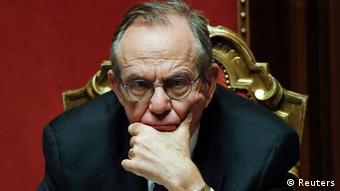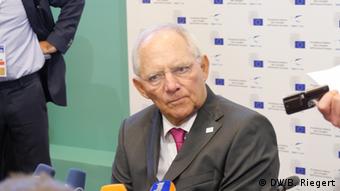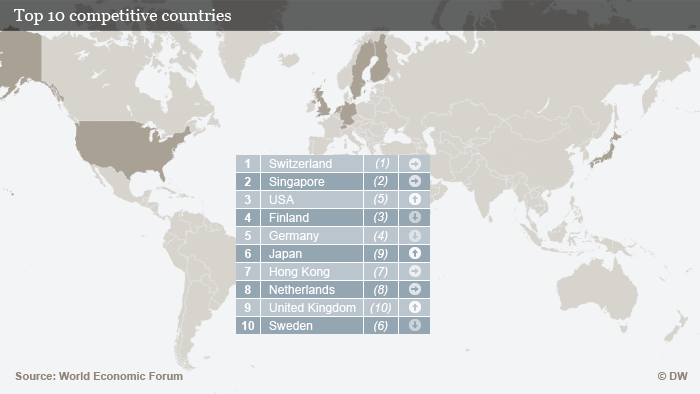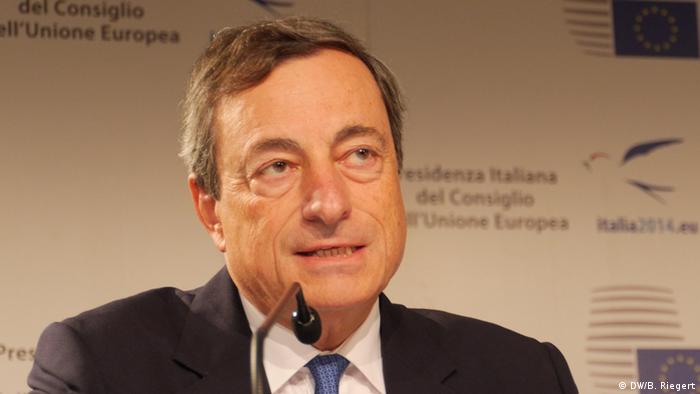EU budget rows: To save or to spend?
The eurozone's finance ministers are at loggerheads in Milan over the right fiscal policy. The main bone of contention: Is it a good idea to raise spending to boost the economy or will high deficits scare investors?
Eurozone is once again facing a serious situation. And this time the immediate danger to the 18-member monetary union is not the stability of the currency or the solvency of any state, but the twin worries of recession and deflation: An economic contraction with a simultaneous drop in prices.
Mario Draghi, President of the European Central Bank (ECB), made his concerns clear to the European finance ministers at their informal meeting in Milan. In the second quarter, the eurozone economy was practically flat. The inflation rate was only 0.3 percent, and unemployment is still far too high, Mario Draghi said.
The central bank, therefore, slashed the key interest rate to virtually zero, he explained. But that means the conventional monetary policy tools of a central bank have been exhausted.
'Hand in hand'
To boost the economy, Draghi plans to provide cheap loans in the coming weeks and months, allowing banks access to low cost, safe money. His hope is that they will finally start lending to businesses again, especially in the crisis-hit southern countries, a Draghi confidant said on the sidelines of the meeting. But there is no guarantee they will.
The ECB is now letting the finance ministers know that because it has reached the limits of its financial instruments, it's now their turn to do something.

Italian Finance Minister Pietro Carlo Padoan wants to save less and make more money available for investments
Draghi put it diplomatically: "Only if structural, fiscal and monetary policies go hand in hand will the euro area see investment return," he warned in Milan. "We will only manage to stimulate investment if structural, fiscal and monetary policies mutually reinforce each other."
The central bank chief expects the finance ministers to provide more money for public investments in their budgets and to create better conditions for business. Since this is not part of the bank's remit, which critics say he has pushed to its extremes, Draghi now expects the ministers to act.
Varied responses
The finance ministers are responding to this warning in very different ways. Italian Finance Minister Pietro Carlo Padoan wants to save less and make more money available for investments. France wants that too, but budgetary discipline would suffer. Furthermore, this could increase the countries' debt burden. Italy and France are already among the eurozone's heavily indebted countries.
EU Budget Commissioner Jyrki Katainen also warned against reckless spending, urging governments to focus on resolving structural problems. "Without real reforms, effectively implemented, we will not have sustainable growth and job creation," he said. Taxes should not be increased to cover shortfalls, he said.
In contrast, while Italian Finance Minister Pier Carlo Padoan and French Finance Minister Michel Sapin hope the EU or new investment funds will provide fresh money, Poland proposed a fund of 700 billion euros. European Commission President Jean-Claude Juncker wants to secure 300 billion euros for public investment.
But there is less clarity on how this should be done and who should pay. Many eurozone countries, nevertheless, argue that Germany should spend more. The EU Commission and the OECD agree.
'Even Germany needs investments'

'We are in an economic environment that requires increased investment in Europe, including in Germany,' Schäuble said
In Milan, German Finance Minister Wolfgang Schäuble tried to nip these hopes in the bud. Of course, Germany is for investment, he said, but this should come primarily from the private sector and industry. The state can only help, but cannot buy jobs, he said.
"We are in an economic environment that requires increased investment in Europe, including in Germany," Schäuble conceded. But behind closed doors, his counterparts were critical, saying the Germans were too fixated on their balanced budget in 2015, which Schäuble had just presented earlier in the week.
Although Schäuble, together with his French counterpart Michel Sapin, had worked out proposals for greater investment, he stuck to his line: "I believe this is the right way: More investment, compliance with the rules on fiscal consolidation, structural reforms, improved institutional framework. Everything together creates lasting growth and more jobs."
Sapin responded to the supposed German stubbornness in his own way. He said he will not adhere to the agreed deficit limits for another two years. No further structural savings were planned in the French budget. Paris stressed that the "exceptional circumstances" clause that allows member states to run a higher deficit also covered the unexpectedly poor economy.

Investment bottleneck: EU countries (apart from the UK) are falling behind on the list of the most competitive economies worldwide
'A downward spiral'
For Schäuble, it's still too early to criticize French budgetary policy. "I'll wait and will keep to the European rules. When the French have agreed on their draft budget, the Commission will assess it. Based on this assessment, we will examine it, but we will not speculate."
The dispute over deficits, investment and the right course of action in the fight against recession and deflation has been postponed for now. But in November, discussions over France, Italy and the budgets of other euro countries are expected to take place.
In a DW interview, Italian economist Tito Boeri warned that crisis countries such as Italy or France will not be able to manage with savings and reforms alone. Instead, they need growth stimulus measures and assistance from the EU. "Otherwise, they face a long-lasting downward spiral of economic stagnation and declining prices," Boeri stressed.
Cheap money?
Klaus Regling, head of the European bailout fund ESM in Luxembourg, deals with investors on financial markets every day. He warns against lax fiscal discipline in the eurozone, which he says is a question of credibility. "Investors are watching closely whether the agreed rules are respected and structural reforms are being carried out in all countries," Regling said in Milan.
Investors who lend money to these countries still believe that ECB chief Mario Draghi will have his way and will spur economic growth with plenty of cheap money, economist Tito Boeri says. But if the euro countries and the ECB fail to agree on the right course to follow, that trust could quickly evaporate. dw de


No comments:
Post a Comment